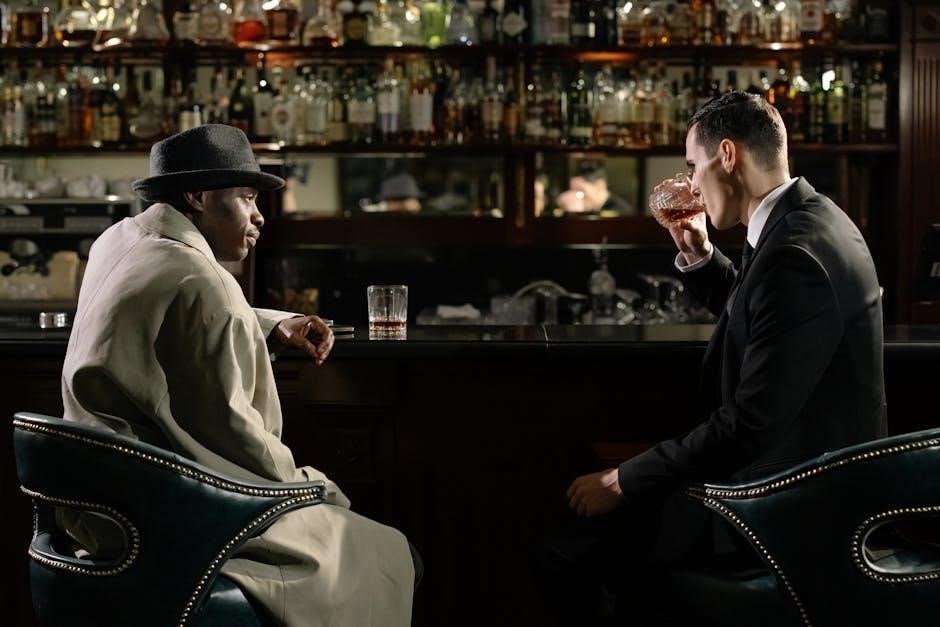Trevor Noah’s Born a Crime is a captivating memoir about his childhood in apartheid South Africa, blending humor with poignant reflections on race, identity, and resilience․
Background of Trevor Noah and the Book
Trevor Noah, a South African comedian and television host, is best known for hosting The Daily Show․ His memoir, Born a Crime, reflects his experiences growing up during apartheid․ Born to a black mother and a white father, his birth was illegal under apartheid laws, literally making him a “crime․” Published in 2016, the book received critical acclaim for its blend of humor and serious commentary on race and identity, offering insights into South African society during and after apartheid․
Reception and Popularity of the Memoir
Born a Crime received widespread acclaim for its vivid storytelling and unique blend of humor and poignancy․ Critics praised Noah’s ability to tackle heavy themes like racism and inequality with wit and sensitivity․ The memoir became a New York Times bestseller and was named one of the best books of 2016 by several publications․ Its popularity led to translations into multiple languages and discussions about adapting it into a film, further cementing its impact on global readers and cultural conversations․

Themes in “Born a Crime”
The memoir explores themes of racial identity, social inequality, and humor as a coping mechanism, offering a powerful reflection on resilience and human experience․
Racial Identity and Apartheid in South Africa
Trevor Noah’s memoir delves into the complexities of racial identity under apartheid, a system that classified people into rigid categories․ Born to a black mother and white father, Noah’s existence was illegal, making his experiences unique․ The book vividly portrays how apartheid’s laws affected daily life, enforcing segregation and inequality․ Through personal anecdotes, Noah illustrates the absurdities and cruelties of the system, highlighting its profound impact on individuals and society․ His story becomes a powerful lens to understand South Africa’s tumultuous past․

Social Inequality and Its Impact on Personal Growth
Trevor Noah’s memoir vividly explores how social inequality shaped his upbringing in South Africa․ Growing up in a society divided by race and class, Noah faced systemic barriers that influenced his opportunities and worldview․ Despite these challenges, his experiences fueled resilience and adaptability, allowing him to navigate diverse environments․ The book highlights how inequality not only limited potential but also inspired resourcefulness and determination, ultimately contributing to his personal growth and success in overcoming societal constraints․
The Role of Humor as a Coping Mechanism

In “Born a Crime,” Trevor Noah illustrates how humor served as a vital coping mechanism amidst the harsh realities of his upbringing․ He often used wit to navigate the complexities of racial tension, cultural differences, and personal struggles․ Humor not only provided solace but also became a tool for connecting with others across divides․ By infusing laughable moments into his narrative, Noah demonstrates how humor can lighten even the darkest situations, fostering resilience and understanding in the face of adversity․

Historical Context of South Africa
South Africa’s apartheid regime, from 1948 to 1994, institutionalized racial segregation, shaping Trevor Noah’s world․ The system’s oppressive laws and societal divisions profoundly impacted daily life and identity․
The Apartheid System and Its Effects
The apartheid system in South Africa enforced racial segregation through laws that divided people into racial groups, denying basic rights to non-whites․ This led to widespread poverty, inequality, and violence․ Trevor Noah’s experiences, as detailed in Born a Crime, highlight how apartheid shaped his identity and upbringing․ The system’s oppressive nature fostered a society of fear and division, leaving lasting scars on the nation and its people․
Post-Apartheid Challenges and Transition

Following apartheid’s end, South Africa faced significant challenges, including economic inequality, social tensions, and the daunting task of rebuilding institutions․ Trevor Noah’s memoir reflects this transitional period, highlighting the gap between legal equality and everyday realities․ The post-apartheid era revealed the deep-rooted effects of decades of segregation, shaping Noah’s perspective on identity, community, and the complexities of national healing․

Personal Stories and Life Lessons
Trevor Noah shares heartfelt anecdotes about his childhood, highlighting his mother’s resilience and the lessons she imparted, which shaped his perspective on identity and overcoming adversity․
Trevor Noah’s Childhood and Family Dynamics
Trevor Noah’s childhood was marked by unique challenges, growing up as a biracial child in apartheid South Africa․ His mother, Patricia Nombuyiselo Noah, played a pivotal role, instilling in him resilience and a strong sense of self․ Despite the societal norms that deemed his existence illegal, Trevor’s family dynamics were filled with love and determination․ His experiences with his mother and grandmother shaped his worldview, offering lessons in survival and identity that would later define his career as a comedian and storyteller․
Key Life Experiences That Shaped His Worldview
Trevor Noah’s worldview was profoundly shaped by his experiences growing up in apartheid South Africa․ Born under a system that criminalized his existence, he navigated the complexities of racial identity and societal segregation․ His mother’s resilience and defiance in the face of oppression instilled in him a strong sense of self-worth․ Experiences in Soweto, interactions with diverse cultures, and his illegal status as a mixed-race child shaped his perspective on inequality and humanity, influencing his later career as a comedian and storyteller․

The Role of Women in Trevor Noah’s Life
Trevor Noah’s mother, Patricia, was a central figure, shaping his resilience and worldview․ Her strength and defiance in the face of adversity deeply influenced his perspective on life and identity․
Influence of His Mother and Other Female Figures
Trevor Noah’s mother, Patricia, played a pivotal role in his life, instilling resilience and a strong sense of self․ Her defiance against apartheid norms and unwavering support shaped his identity․ Other female figures, like his grandmother, also influenced his worldview, teaching him cultural values and survival strategies․ These women’s strength and wisdom helped Trevor navigate South Africa’s complexities, fostering his determination and humor as coping mechanisms․ Their impact remains central to his storytelling and perspective on life;

Reception and Impact of the Book
Born a Crime became a bestseller, praised for its raw storytelling and humor․ It sparked global conversations on race, identity, and inequality, resonating deeply with readers worldwide․
Reviews and Literary Criticism
Born a Crime received widespread critical acclaim for its raw storytelling and humor․ Reviewers praised Noah’s ability to balance lighthearted anecdotes with profound reflections on race and identity․ The memoir was lauded for its emotional depth and vivid portrayal of life under apartheid․ Critics highlighted Noah’s unique voice and his skill in making complex themes accessible․ While some noted its occasional unevenness, the book was largely celebrated for its authenticity and resonance, solidifying its place as a modern literary gem․
Cultural and Social Impact of the Memoir
Born a Crime has had a profound cultural and social impact, sparking global conversations about race, identity, and inequality․ The memoir has inspired millions, offering a lens into South Africa’s complex history and its post-apartheid struggles․ It has also empowered marginalized voices, encouraging dialogue on systemic racism and resilience․ Adapted into a film and audiobook, the memoir’s reach expanded, making it a significant cultural artifact․ Its influence extends to educational settings, where it is widely studied to explore themes of identity and social justice․
Born a Crime is a testament to resilience, humor, and the power of storytelling, leaving readers with a profound understanding of identity, inequality, and hope․
Final Thoughts on the Book’s Significance
Trevor Noah’s Born a Crime offers a unique perspective on race, identity, and resilience, making it a significant read․ It bridges cultural gaps, fostering empathy and understanding․ The memoir’s blend of humor and heartache provides insight into South Africa’s complex history and its post-apartheid challenges․ Noah’s storytelling highlights the universality of human struggles, making the book relatable and impactful․ It’s a powerful reminder of the importance of empathy and the enduring strength of the human spirit in overcoming adversity․
Recommendations for Readers
Readers seeking a blend of humor and heartfelt storytelling will find Born a Crime captivating․ Trevor Noah’s memoir offers unique insights into life under apartheid and its aftermath, making it a must-read for those interested in social justice and cultural narratives․ The book’s accessibility and humor make it a great choice for a wide audience, including young adults and history enthusiasts․ It’s both a compelling page-turner and a thought-provoking exploration of identity and resilience․




